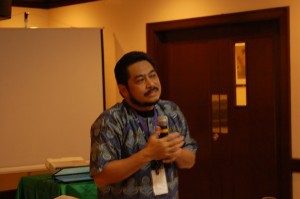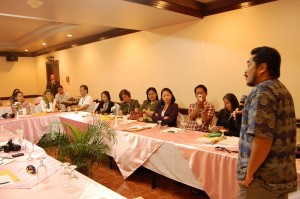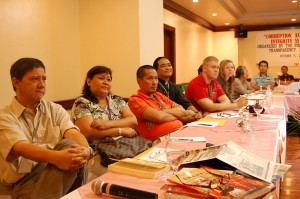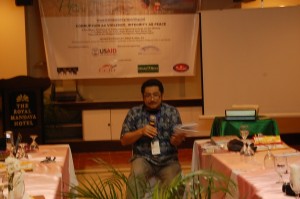DAVAO CITY (MindaNews/13 October) – A “change in paradigm” and the ability to detect the subtle forms of corruption are needed to effectively combat a problem that has beset not just the government but also a number of private institutions, a priest who is actively involved in anti-corruption initiatives told participants to a forum on transparency Monday at the Royal Mandaya Hotel here.
Fr. Albert Alejo, SJ, a social anthropologist and leading figure in the anti-corruption project called Ehem, said that simply fighting corruption is not enough because the purpose is not just to imprison people [who are found guilty] but to establish a new kind of society.
 Fr. Albert E. Alejo, Sj. MindaNews photo by GG Bueno
Fr. Albert E. Alejo, Sj. MindaNews photo by GG Bueno
He said there’s a need to “introduce a new world by introducing new words and new meanings, and let these develop into a new culture.”
“But using language as a tool to fight corruption goes beyond the catchwords we develop, which may disappear from popular use. The challenge is how to popularize it. We may have to rearrange the people’s experiences so that their ways of thinking would change,” he clarified at the forum dubbed “Corruption as Violence, Integrity as Peace.”
Alejo cited the case of “good schools” that turn a blind eye on their alumni who have become corrupt officials mainly because they donate huge amounts to the schools. He said these schools should venture into a “change in paradigm” by regarding the good deeds of their honest alumni as the best donations they could ever have.
“If we change the paradigm, the judge who does not receive bribes is the best donation of the school to society,” he said.
“Corruption here is like gambling and smoking, i.e. it has become habitual. It’s being committed not because of survival but because it’s seen as an opportunity. Gago ka pag di ka tumanggap (You’re stupid if you won’t accept),” a participant said, adding he has become cynical over [the issue of corruption].
 Fr. Alejo with participants. MindaNews photo by GG Bueno
Fr. Alejo with participants. MindaNews photo by GG Bueno
Alejo cautioned that becoming cynical would mean having two enemies, corruption and cynicism itself. He said one should not surrender because corruption not only enriches the corrupt but also has adverse effects on the lives of people.
“Maybe it wouldn’t be much of a problem if its only effect is enriching the corrupt,” Aleojo said, but “corruption has ill effects and it is not just that your law is violated. If Jokjok Bolante steals money that should have enhanced farmers’ production, then the farmers wont’ have enough harvest, won’t be able to send kids to school. The point is, corruption kills people.”
Alejo said that people have the wrong presumption that those who fight corruption are themselves clean. He said that even some non-government rganizations are involved in corrupt practices.
A participant said he agrees with Alejo’s observation, noting that NGOs now are allegedly engaged in luxurious practices like buying expensive vehicles and trying to outdo each other in terms of implementing novel or pioneering projects so that they may corner more funds.
“There’s a need for an advocacy to do away with external funding, although it sounds too idealistic. People must be thought
self-reliance by developing their entrepreneurial skills,” he suggested.
 Participants listen to Fr. Alejo's discourse on corruption. MindaNews photo by GG Bueno
Participants listen to Fr. Alejo's discourse on corruption. MindaNews photo by GG Bueno
Alejo noted that the issue of corruption is not mentioned in interfaith dialogues with the people involved in them claiming it
would be difficult to do so.
He further noted that there’s resistance to including it as among the agenda in peace talks owing to fears it might affect
confidence-building efforts.
But Alejo stressed that sincerity, an important element in peace talks, is a concrete manifestation of integrity. He cited in
particular the need to honor agreements [signed with rebel groups] and, apparently alluding to the botched Memorandum of Agreement on Ancestral Domain, for the government to concretize its sincerity by speaking as one on policy matters.
Sounding optimistic that a peace agreement would soon be signed between the government and Moro Islamic Liberation Front, the priest said the people should be vigilant on how money intended for war-torn areas would be spent.
“Sooner or later, there will be a peace agreement and money will pour into conflict-affected areas. The challenge is to prevent corruption in this post-conflict scenario. If money is squandered, the peace agreement would go to waste,” he warned.
Participants to the forum came from the academe, media, NGOs, religious sector and the Technical Working Committee of the Multi-Sectoral Anti-Corruption Council of the Office of the Deputy Ombudsman for Mindanao.
 Fr. Alejo. MindaNews photo by GG Bueno
Fr. Alejo. MindaNews photo by GG Bueno
The forum was organized by the Philippine Public Transparency Reporting Project (www.transparencyreporting.net), a joint undertaking of the Center for Community Journalism and Development, Institute for War and Peace Reporting, MindaNews and National Union of Journalists of the Philippines.
The project is funded by the US Agency for International Development with technical support from the American Bar Association Rule of Law Initiative. (H. Marcos C. Mordeno/MindaNews)
